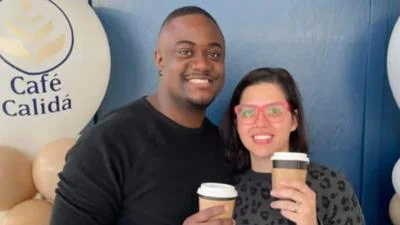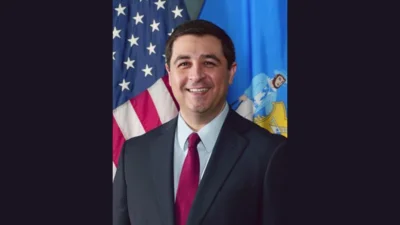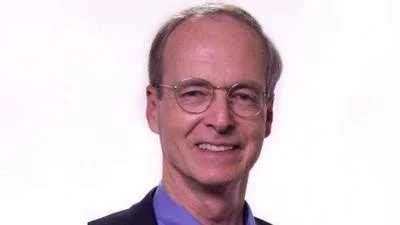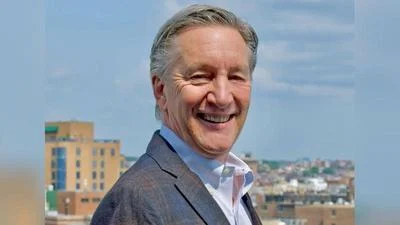Austin Chamber of Commerce issued the following announcement on April 10.
Last Tuesday, Chicago Police stationed officers at four West Side crime hotspots, asking people to show ID. Only people who lived on the blocks there were allowed to enter.
As first reported by the Sun-Times, the move was designed to reduce criminal loitering and enforce the state's stay at home rule to curb the spread of coronavirus, police officials said. The blocks, which police spokesman Anthony Guglielmi described as open-air drug markets, have hosted large gang gatherings in recent weeks, police said.
But civil rights groups, including the American Civil Liberties Union and West Side Justice Center, questioned if the move was constitutionally sound.
"Anytime you see your movements are restricted in some way, of course we begin to think about constitutional rights. But also human rights," said Tanya Woods, who runs the West Side Justice Center.
Several officers who were sent to the blocks by Harrison (11th) District Cmdr. Darrell Spencer were hesitant to follow orders because they also were concerned the move was not constitutional, the Sun-Times reported.
The action restricted access to four blocks: the 200 block of South Springfield Avenue, the 3900 block of West Van Buren Street, the 3800 block of West Gladys Avenue, and the 1100 block of North Monticello Avenue.
'This is a public health issue'
Officers were monitoring the hotspots to strictly enforce the stay at home order, not to make arrests on gang or drug charges, Guglielmi said.
"I want to be very clear here: this is a public health issue. This is not a policing issue," Guglielmi said, comparing the closed residential blocks to Mayor Lori Lightfoot's shutdown of the lakefront and adjacent parks. "This is not an effort to combat drug dealing. This is an effort to disperse groups."
Police do not plan to implement similar restrictions and ID requirements in other parts of the city, Guglielmi said. They targeted the West Side blocks because people there were not complying with the state's stay at home order, he said.
Police started tracking how many crowds they had to break up on March 29. The Harrison (11th) Police District is struggling with crowds the most of any police district, police said.
On March 29 alone, police reported 89 dispersals of groups in the Harrison District, Guglielmi said. The next highest number of dispersals on that day was four dispersals in the Austin (15th) Police District.
On March 31, the Harrison District reported 54 dispersal orders. Since dispersals have been tracked, there have been no citations or arrests in the Harrison District related to the health order, Guglielmi said.
Police decided to put the troubled blocks under constant surveillance after initial efforts to break up groups did not have lasting success, Guglielmi said.
"Individuals would literally walk around the block, wait for the police officers to leave and then come right back," he said.
But if restricting access to blocks doesn't work either, "we're going to have no choice but to make arrests for criminal activity," Guglielmi said.
'We're only zeroing in on some communities'
Restricting access to blocks might violate people's rights, civil rights groups worry.
"This sort of road block raises constitutional concerns about limiting people's movement and requiring people to 'show papers' to travel within Chicago," said ACLU spokesman Ed Yohnka said.
The police order "does not appear to be supported by concerns about public health or track the requirements of the current public health orders," Yohnka said.
"Our current public health crisis should not be used as cover for heavy-handed policing targeting communities of color," he said.
Answering a public health crisis with policing in Black and Latino communities will exacerbate already tense relations with police, said Woods, who runs the West Side Justice Center.
"When you now introduce police presence under the guise of trying to enforce a health order, it certainly puts a strain on the relationship between law enforcement and the community that they serve," Woods said.
Since the West Side is already heavily policed, it can be expected dispersal numbers will be higher there, Woods said. Groups are still gathering all across the city "but nobody's really paying attention, because we're not concerned about those other communities," she said.
"If we're only zeroing in on some communities, then we're probably more often going to find people congregating there," she said.
Instead of policing, the city should put more effort into street outreach to educate historically marginalized groups, recruiting them to help spread the social distancing gospel rather than ostracizing them, Woods said.
Despite the coronavirus crisis, individuals are entitled to their constitutional rights, First Defense Legal Aid attorneys said. When approached by police, people have the right to refuse to be searched or patted down, and can decline to answer questions without an attorney present.
'The problem is deeper than … corona'
The coronavirus pandemic has exacerbated issues crime hotspots in the 28th Ward have long faced, said Ald. Jason Ervin, who represents the area.
Since folks aren't practicing social distancing on those blocks, the added police presence is needed to keep everyone safe and healthy, he said.
"The problem is deeper than just the issue of corona," Ervin said. "There have been some longstanding issues with narcotics with people who don't live in the area who come there to buy drugs. …It does create a situation where this level of enforcement is necessary."
Ervin pushed back on the constitutional concerns the West Side Justice Center and the ACLU raised. In his ward, where three of the four closed blocks are located, 85 percent of residents supported stronger laws against criminal loitering, he said.
Earlier this month, two people were shot on the 3900 block of Van Buren, one of the blocks where police were restricting access.
"When people from the ACLU move to West Garfield Park and have to experience the challenges and issues that we experience, then I will listen to them," he said.
Pascal Sabino is a Report for America corps member covering Austin, North Lawndale and Garfield Park for Block Club Chicago.
Original source can be found here.






 Alerts Sign-up
Alerts Sign-up